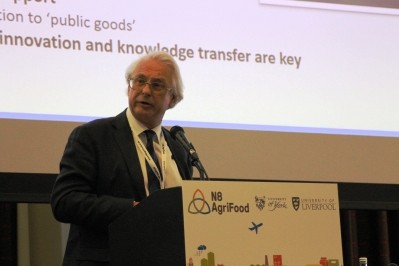Food industry needs to work together: FDF boss

Speaking at the Campden BRI Day this morning (6 June), Food and Drink Federation (FDF) chief executive and guest lecturer Ian Wright warned of the segmentation in the industry.
“One thing struck me about our sector when I joined FDF [is] we are absurdly fragmented,” he said. “We love to segment and compartmentalise ourselves. We love a good ‘niche’ in food and drink.
“When FDF convenes, on behalf of Defra [Department for Environment, Food and Rural Affairs], a monthly meeting of food and drink trade associations for an update on Brexit, we often have 40 organisations around the table and we could have 70.
“Some sub-sectors of the industry have several trade associations. None of this is intrinsically bad. I’m not criticising it. One can see why it has happened.”
He said this wasn’t going to work as the UK prepares for Brexit. “But it is a model deeply unsuited to the challenges we are now facing. It makes it hard for food and drink to speak clearly and consistently, and to signal the scale of the industry we represent.”
Being taken for granted
In his lecture, Wright also warned against the food industry being taken for granted.
“We have come to believe that the UK’s extraordinary food and drink success story is just the natural order of things, But it ain’t. Over recent years, too many of us have come to take for granted the amazing success story that UK food and drink represents.”
Listing off competitive food prices, innovation, research, reformulation to meet health needs, distribution networks and supply chains, he warned that all this doesn’t just happen by itself.
“All of this. All of. Taken for granted. By Government. By regulators. By investors. By our critics and detractors. And, probably most worryingly, by us, by ourselves. Occasionally, horsemeat or Fipronil or Russell Hume come along and provide a wake-up call.”
Wright also raised the importance of training up the next generation, but expressed concern about attracting more people to the industry.
‘Sector’s key strengths’
“We have long known that one of our sector’s key strengths is the 400,000 people we employ, across the UK and at all skills levels. These people are key to the future productivity growth of the industry.
“Currently, we struggle to recruit the engineering and technical experts able to support innovation and secure inward investment due to a national shortage of STEM [science, technology, engineering and mathematics] skills, the misperception of the sector as lower-skilled and competition from other manufacturing sectors. With 140,000 new recruits needed by our industry by 2024, this challenge will only be magnified by changes to access to foreign labour post-Brexit.”
He added that the FDF hoped to become a leading light in the food industry to help cultivate new workers.
“To address these issues, we will provide leadership and commitment to a new higher-level skills ambition for apprentices, including upskilling for existing employees.
“We will commit to invest in and fully utilise the newly developed food engineering apprenticeship provision, including the degree apprenticeships.”
















